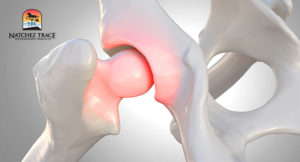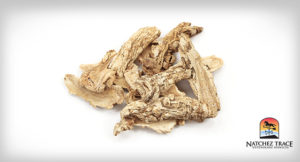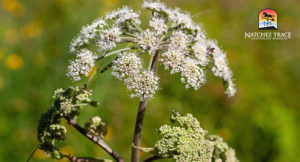Angelica Herb Helps Your Pets Joints
Many herbal formulas used here at Natchez Trace Veterinary Services contain angelica as one of the main ingredients, so we thought you might be interested in this fantastic herb’s history, use, and effects.
One of our popular herbal formulas is Angelica Harmonize Joints.
It is a Traditional Chinese herbal blend for maintaining healthy joint function.
 From the Traditional Chinese Medicine perspective, joint discomfort results when there is an obstruction in the flow of energy, also called “Qi,” through the tissue of the joint along with an invasion of external factors such as damp, cold, and wind.
From the Traditional Chinese Medicine perspective, joint discomfort results when there is an obstruction in the flow of energy, also called “Qi,” through the tissue of the joint along with an invasion of external factors such as damp, cold, and wind.
The obstruction and invasion may come from trauma, overuse of limbs, poor genetics, prolonged exposure to wind and dampness, etc.
Chinese theory recommends a blend of herbs to help move Qi and blood in and around the joints to reestablish and maintain healthy function.
Angelica herb helps do it all.
Angelica Herb Facts
The history and folklore behind Angelica herb are fascinating, so we have included them here for your reading pleasure.
Where Angelica Grows
Angelica herb is a tall, stout woody perennial that thrives best in slightly acidic, damp soil in light shade and is relatively easy to grow from seed.
It is believed to be a native of Syria, spreading to many European countries. It now grows at high altitudes in the damp, cold mountains of Japan, China, and Korea.
Angelica is a member of the celery family and is a fragrant perennial plant. The plant has smooth purplish stems with umbrella-shaped clusters of white flowers and produces winged fruits in July and August.
Angelica is used extensively in herbal medicine. The main constituents of Angelica are volatile oils, valeric acid, angelic acid, angelicin, safrole, scopoletin, and linoleic acid, making it useful in the treatment of fevers, colds, coughs, flatulent colic and other stomach disorders. A medicinal infusion made from stems, seeds, and root is carminative, diaphoretic, emmenagogue, sedative, stomachic and tonic. Angelica is used for obstructed menses and should not be taken in large quantities by pregnant women. -Alternative Nature Online Herbal
Links to Archangel Michael
The name Angelica comes from the Medieval Latin herba angelica, which means “angelic herb.” It is reportedly named so because of its special powers against poison and plague.
According to one legend, Angelica was revealed in a dream by an angel to cure the (bubonic) plague. Another explanation of the name of this plant is that it blooms on the day of Michael the Archangel (May 8, old style), and is on that account a preservative against evil spirits and witchcraft: all parts of the plant were believed efficacious against spells and enchantment. It was held in such esteem that it was called ‘The Root of the Holy Ghost.’ -A Modern Herbal: Angelica
Angelica herb was once considered one of the earth’s most potent herbs and was even given the nickname “Root of the Holy Ghost.”
It was thought to be under the protection of Michael the Archangel because it blooms on his feast day, and its roots, leaves, and seeds have been used as a culinary and medicinal herb for centuries.
Medicinal Benefits of Angelica Herb
 In Traditional Chinese Medicine, Angelica Sinensis is called “Dang Gui.”
In Traditional Chinese Medicine, Angelica Sinensis is called “Dang Gui.”
It is also known as female ginseng and Dong Quai.
The channels influenced by Dang Gui are Heart, Liver, and Spleen.
Traditional Chinese Medicine uses Angelica herb to tonify blood, harmonize blood, disperse cold, unblock bowels, moisten intestines, reduce swelling, expel pus, stop the pain, and generate flesh.
Traditional Chinese Medicine always recommends combining Angelica with other herbs.
In Western herbal medicine, the roots, stalk, and leaves are commonly used and possess carminative, stimulant, diaphoretic, stomachic, tonic, and expectorant properties.
It is often used as a stimulating expectorant to treat fevers, colds, coughs, colic, rheumatism, and urinary diseases.
Are you interested in improving your pet’s health with herbals and/or Traditional Chinese Veterinary Medicine?
Sources:
- A Modern Herbal: Angelica
- Angelica – Alternative Nature Online Journal
- Angelica: The “Angel of Herbs”
- Dang Gui (Chinese Angelica Root, Radix Angelicae Sinensis
- Herbsmith Rx
- India Ayurvedic Herbs: Angelica









